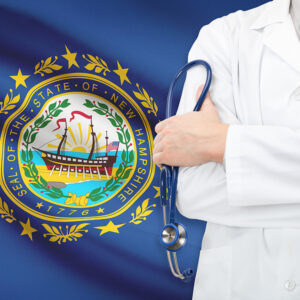Seeing this year’s health-related legislation move through the State House, it’s clear we are at a crossroads. In a post-pandemic world where public trust in health institutions has been badly shaken, our lawmakers have a chance to lead by coming together to restore faith in public health through bipartisan action.
The COVID-19 pandemic was more than a public health crisis; it was a crisis of trust. Conflicting messages, changing guidelines, and political infighting left many Granite Staters confused, frustrated, and suspicious of institutions they once relied on. That damage won’t be repaired overnight, but thoughtful, bipartisan health policy is one of the surest ways to begin rebuilding trust.
We’ve seen encouraging steps in this direction. HB223, which streamlines regulations for health care providers near critical access hospitals, passed with broad support and strengthens rural care. HB140, which creates a discreet “blue envelope” for individuals with autism to present during traffic stops, is another example of a respectful, practical solution that came from working across the aisle.
I was proud to cosponsor bipartisan bills this session that expand access to health care in practical, life-saving ways. HB72 strengthens telehealth services, especially for rural communities, while HB73 brings harm reduction into our opioid response, such as by expanding access to tools like Narcan. These commonsense policies may not make headlines, but they show that when we work together, we can deliver real results and rebuild trust in public health.
Unfortunately, shared problem-solving is too rare. The decision to shelve HB724, which would have aligned New Hampshire’s child lead poisoning standards with CDC guidance, was a missed opportunity to show a bipartisan commitment to kids’ health. This wasn’t big-government overreach; it was a targeted, evidence-based measure with clear health benefits. The same can be said for HB583, a bill that would have ensured automatic free or reduced-price school meals for children whose families are on Medicaid – a measure that would cut red tape for children who are already eligible. Lawmakers blocked even a modest two-year pilot.
If lawmakers want to earn back public trust, we must do more than avoid controversy; we must demonstrate that health policy can be responsible, respectful, and rooted in evidence. Bipartisan cooperation is key to that effort. Passing fair, transparent, and effective health laws sends a message: you can believe in this process again.
The pandemic taught us that trust, once lost, is hard to regain. It also reminded us how essential that trust is when lives are on the line. New Hampshire has a proud tradition of sensible governance. We don’t need Washington-style showdowns; we need leadership that listens, adapts, and acts in the best interests of everyone, regardless of party. The pandemic damaged our faith in effective leadership and public health. If we want to repair this damage, we must reject partisanship and double down on common ground. Bipartisan health policy isn’t just good governance. Right now, it’s a public necessity.





